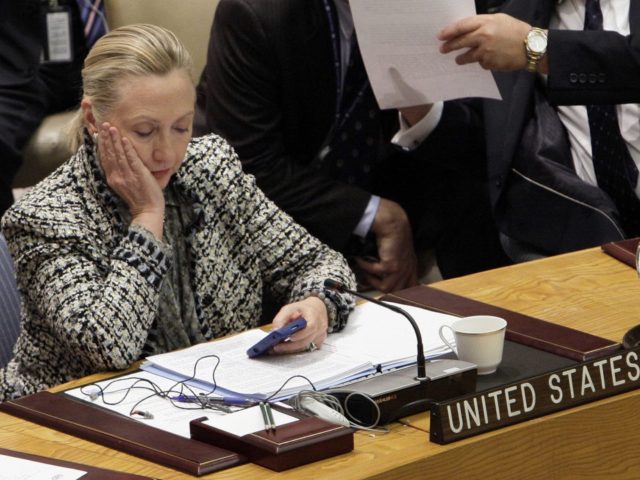What did the Russians know, and when did they know it? A question for today and President Trump? Actually, this should be asked regarding the years when Hillary Clinton was secretary of state. The illicit system she cobbled together to send and receive emails was essentially transparent to the Russians and, for that matter, anyone else with a smidgen of technical expertise.
As the latest example of this, Judicial Watch submitted new evidence to U.S. District Court Judge Emmet G. Sullivan showing that former Secretary of State Hillary Clinton knowingly used an unsecure BlackBerry device despite being warned by “security hawks” against doing so.
Judicial Watch obtained the email record in a response to a court order from a May 5, 2015, lawsuit against the State Department (Judicial Watch, Inc. v. U.S. Department of State (No. 1:15-cv-00684)) after it failed to respond to our March 18, 2015, Freedom of Information Act (FOIA) request seeking: “All emails of official State Department business received or sent by former Deputy Chief of Staff Huma Abedin from January 1, 2009, through February 1, 2013, using a non-‘state.gov’ email address.”
The new document brings the known total to date to at least 433 emails that were not part of the 55,000 pages of emails that Clinton turned over to the State Department. These records further appear to contradict statements by Clinton that, “as far as she knew,” all of her government emails were turned over to the State Department.
The email was sent to Susan Kennedy, presumably former Gov. Arnold Schwarzenegger’s chief of staff. Kennedy wrote Clinton on March 7 2009: “Just in case you are still allowed to carry your Blackberry, your friends are watching with great pride.” Clinton responded on March 8, 2009:
Against the advice of the security hawks, I still do carry my berry but am prohibited from using it in my office, where I spend most of my time when I’m not on a plane or in a “no coverage” country.
The email, uncovered by Judicial Watch and written by Clinton, demonstrates that she reviewed or was at least informed about a March 6, 2009, Information Memo from Assistant Secretary of State for Diplomatic Security Eric J. Boswell to Clinton Chief of Staff Cheryl Mills in which he wrote that he “cannot stress too strongly, however, that any unclassified BlackBerry is highly vulnerable in any setting to remotely and covertly monitoring conversations, retrieving email, and exploiting calendars.” [Emphasis added]
In a recent court filing pertaining to the pending motion to compel Clinton to answer interrogatory questions she refused to answer under oath, Judicial Watch argues that interrogatory 14 is particularly important:
Interrogatory 14 seeks to uncover why Secretary Clinton continued using a personal BlackBerry to conduct State Department business after being advised of the risks in doing so. This interrogatory is pertinent because Secretary Clinton’s personal BlackBerry was an integral part of the operation of the clintonemail.com system, a subject squarely within the scope of discovery. It was how she accessed her email. Without her personal BlackBerry, there likely would have been no clintonemail.com system because the Secretary did not use a desktop or laptop and a State Department BlackBerry would have linked to an official “state.gov” email account.
Judicial Watch submitted the questions to her under a court order on August 19, 2016, in a separate lawsuit.
Clinton seemingly ignored the advice of “security hawks” and violated numerous laws related to the handling of classified material and government documents. The State Department sat on this document for 18 months. It is a smoking gun that shows why she must be held accountable under criminal and civil law.
Clinton refused outright to answer questions about the creation of her email system; her decision to use the system despite warnings from State Department officials; and the basis for her claim that the State Department had “90-95%” of her emails.
In her responses sent to Judicial Watch and the court on October 13, 2016, Clinton refused to answer three questions and responded that she “does not recall” 20 times concerning her non-government clintonemail.com email system. She preceded her responses by eight “general objections” and two “objections to definitions.” The words “object” or “objection” appear 84 times throughout the 23-page document submitted to the court and Judicial Watch.
The Clinton responses to interrogatives were received in the Judicial Watch Freedom of Information Act (FOIA) lawsuit before the U.S. District Court for the District of Columbia, which was first filed in September 2013 seeking records about the controversial employment status of Huma Abedin, former deputy chief of staff to Clinton (Judicial Watch v. U.S. Department of State (No. 1:13-cv-01363)). The lawsuit was reopened because of revelations about the clintonemail.com system.
You can find the full history of this case here.
Tom Fitton is president of Judicial Watch.

COMMENTS
Please let us know if you're having issues with commenting.